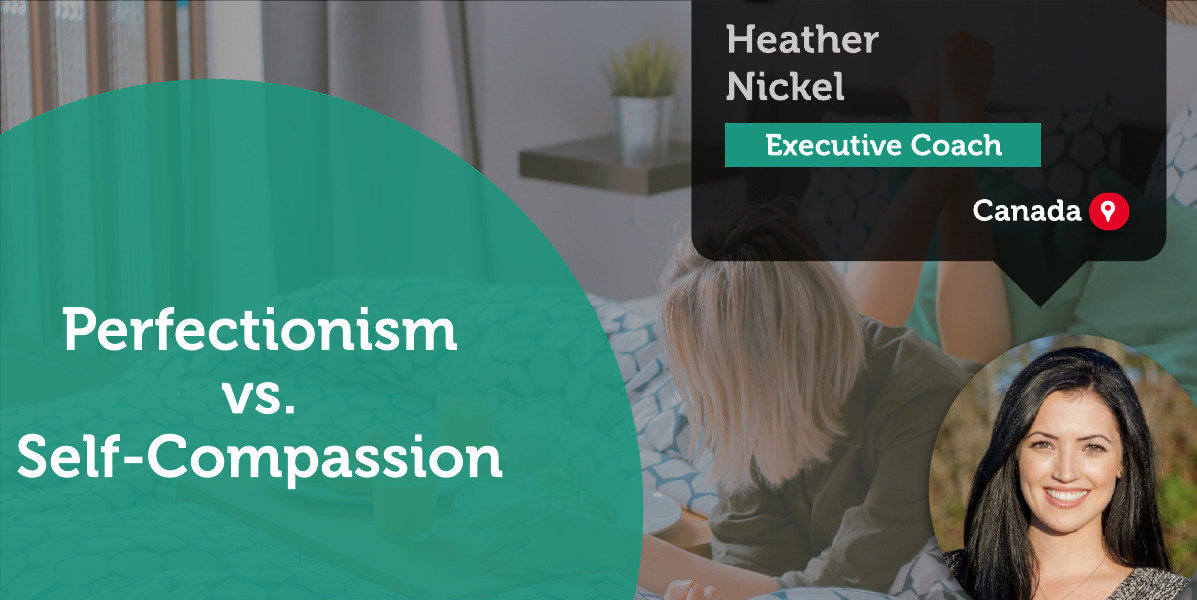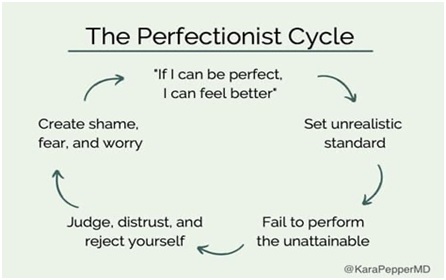A Coaching Power Tool By Heather Nickel, Business/Executive Coach, CANADA

The Business Executives Antidote to Perfectionism vs. Self-Compassion
Perfectionism has become a way of life for many executives. In business, ‘hustling’ is praised and demands on executives to be better, faster, and stronger have increased. Perfectionistic tendencies are rooted in fear and insecurity because the person in the perfectionistic cycle is afraid that if they don’t keep their standards then they will lose their status and performance (Harvard Business Review, 2019). This is detrimental to the health and happiness of executives both at work and at home. At the core, perfectionism drives negative self-talk and encourages the endless pursuit of achievement, without enjoying the process. On the opposite side of perfectionism is self-compassion, which is a freeing approach to overcome perfectionism.
Techniques to Overcome My Perfectionistic Tendencies
Before I started the International Coach Academy program, I never thought of myself as a perfectionist. However, as I began being coached, the sessions always circled back to perfectionism. I was burning out, unable to be satisfied with my accomplishments or enjoy the journey. I felt stressed out and like I was failing continually. The focus on perfection in every area of my life was forcing me to miss out on the beauty of the present and eventually my mental and physical health deteriorated. As I began to research and use techniques to overcome my perfectionistic tendencies, I also began coaching others with the same issue. I chose this power tool because it has helped me personally and can help others who deal with the same perfectionistic tendencies.
Perfectionism vs. Self-Compassion Explanation
What Is Perfectionism?
According to Oxford Review, there are three types of perfectionism (Wilkinson, 2018):
- Adaptive Perfectionism – high personal standards that allow the person to adapt to changes in the environment.
- Maladaptive Perfectionism –creating unrealistically high standards that are not easily met. When they are not met, the person goes into a cycle of negative self-talk that can create depression, anxiety, and stress. They have high demands on the world and are consistently let down. Maladaptive perfectionists become laser-focused on an end goal and are unable to enjoy the process. It fuels disappointment, fear of failure, and sadness. In addition, it creates a continual stream of unachievable perfection and ignores the joy that comes from a process of learning and growing. Maladaptive perfectionism can lead to overwork or complete avoidance of tasks to protect oneself from falling.
- Non-perfectionists – people that have pre-stated expectations of themselves, others, and situations.
Maladaptive Perfectionism Examples (C, 2021):
- Overanalyzing emails
- No room for mistakes
- All or nothing approach
- Hard on oneself
- High standards
- Success is fleeting
- Focusing only on what went wrong
- Comparing oneself unrealistically to others
- Focusing on the end product instead of the journey to learn
- Shying away from learning something new for fear of not being perfect
- Spending unbalanced amounts of time to perfect something, sacrificing sleep and other important needs
Maladaptive Perfectionism functions in a cycle that is shown below:
 The cycle of perfectionism can keep a person stuck in achieving their goals and in a cycle of feeling bad about themselves. To move a person forward, self-compassion can break the cycle.
The cycle of perfectionism can keep a person stuck in achieving their goals and in a cycle of feeling bad about themselves. To move a person forward, self-compassion can break the cycle.
What Is Self-Compassion?
Self-compassion is mastering the internal self-talk and changing it from, ‘You’ll never be good enough to ‘I am enough. It is the process of taking care of oneself and talking to oneself in a way that is filled with care. (Hibberd, 2019).
There are three aspects to self-compassion (Neff, 2020):
- Self-kindness vs. Self-judgement: a person that is practicing self-compassion recognizes that failure and disappointment are an inevitable part of life. They know that being imperfect is a reality and so when failure and disappointment happen, they are kind to themselves and don’t judge themselves negatively for the experience.
- Common humanity vs. Isolation: suffering and dealing with personal inadequacy is a human experience. Everyone at one point or another will experience both. As a result, people practicing self-compassion understand that they are not alone in what they feel and can accept their feelings as normal. In contradiction, the perfectionist believes they are the only person in isolation dealing with these feelings of inadequacy.
- Mindfulness vs. Overidentification: mindfulness is a non-judgemental state where a person can be aware of what they are feeling without any judgment about the feelings. The feelings are acknowledged instead of suppressed and they are not exaggerated. The person accepts the feeling as separate from themselves. For example:‘I feel inadequate in this moment’ vs. ‘I am inadequate’.
A person can implement self-compassion through the following steps:
- Take care of your body by eating well and exercising.
- Be mindful of your inner critic and what it’s saying to you and respond to the thought with warmth and tenderness. Reframe the statement to something that a friend would say to you about the situation (ie. ‘I always get that wrong!’ To ‘I made the wrong choice, but I will get it next time (Harvard Health, 2021)).
- Journal about negative events by using a compassionate approach and writing about it in a kind way (Neff, 2021).
- “Pick a few things you want to do well. Don’t expect to be your best 100 percent of the time and be flexible in your approach, rather than setting one standard for every area. Rather than trying to evaluate yourself all the time and constantly coming up short, make your goals reachable and take on board your success.” (Hibberd, 2019, p. 118).
Breaking the Perfectionist Cycle With Self-Compassion
The coach will recognize perfectionism and aim to shift the perspective of the client by breaking the perfectionist cycle with self-compassion. The person can move from the maladaptive perfectionist to the adaptive perfectionist and be able to reverse their negative self-talk through self-compassion. This breakthrough will allow the client to release the feelings of shame, fear, and worry with a more realistic view of the situation and their expectations.
Some coaching questions to address perfectionism include:
- What are a few things you can focus on doing well?
- What can you acknowledge yourself for?
- What is a realistic goal?
- What can you celebrate?
- What assumptions are you making?
- What is your narrative telling you?
- What is it true?
- What can you control?
- What is the alternative view?
- What do you need at this moment?
- What are some ways to manage expectations?
- What would a loving person in your life say to you about this?
How to Overcome Perfectionism
Many people are functioning in the maladaptive form of perfectionism, stuck in a cycle of unrealistic goals and negativity. This can lead to anxiety, depression, and the inability to move forward to achieve goals. The role of a coach with a client dealing with perfectionism is to ask appropriate questions to change the client’s perspective from a negative self-talk cycle to a self-compassionate approach. This can include setting realistic goals, reducing the expectations on the client and others, and lovingly speaking to oneself. It’s normalizing feelings of inadequacy and failure through mindfulness and releasing judgment of those emotions. By taking these steps, a client can overcome their perfectionist cycle and change into more of an adaptive perfectionist. The adaptive perfectionist can set reasonable personal standards that allow for adaptation to the environment and compassionate self-talk.
References
Top 11 Signs That You Are a Perfectionist. Personal Excellence.
Definition and Three Elements of Self Compassion | Kristin Neff. Self-Compassion.
Harvard Health. 4 ways to boost your self-compassion.
Hibberd, J. The Imposter Cure: Escape the mind-trap of imposter syndrome. Aster.
How to Manage Your Perfectionism. Harvard Business Review.
Neff, K. Self-Compassion Exercises by Dr. Kristin Neff. Self-Compassion.
[Perfectionist Cycle]. (n.d.).
Wilkinson, D. Perfectionism: The different types of perfectionists and how they cope. The Oxford Review.